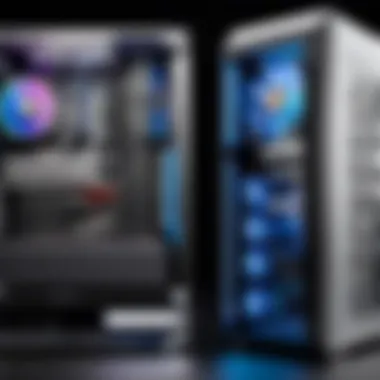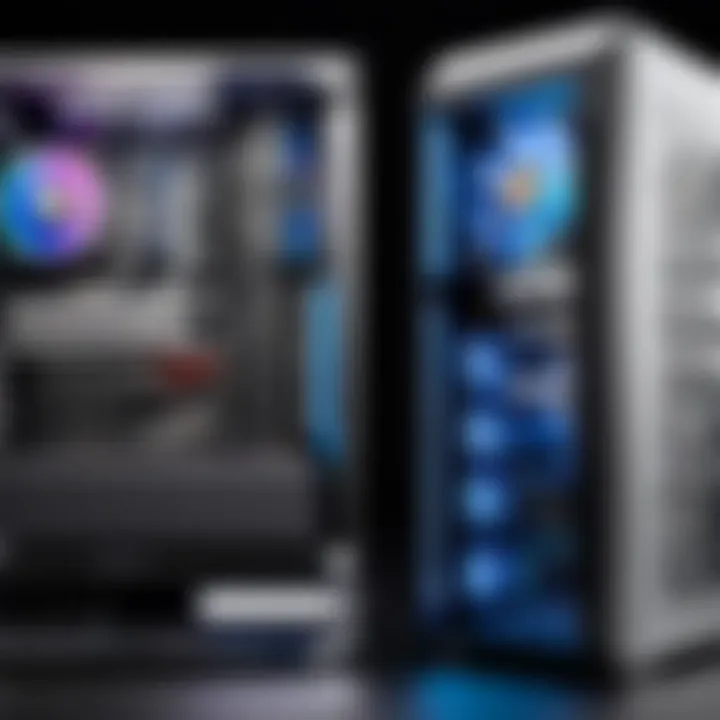Exploring Gaming Computers in Canada: A Comprehensive Guide


Intro
The landscape of gaming computers in Canada has evolved significantly over the years. As the popularity of gaming has surged, so too have the options available to consumers. This article aims to provide a thorough examination of gaming computers in Canada, focusing on key components, market trends, and purchasing options. Understanding these elements is crucial for anyone looking to enhance their gaming experience or build a custom system.
With the diverse range of hardware specifications, it is essential to comprehend what each component brings to the table. Additionally, regional variations in pricing can affect purchasing decisions. We will explore these aspects in detail, offering insights into the strengths and weaknesses of both custom builds and pre-built systems, as well as the future of gaming technology in the Canadian market.
Overview of Gaming Computers in Canada
In today's technological landscape, gaming computers have become a central focus for avid gamers and tech enthusiasts alike. Their importance is particularly pronounced in Canada, where the gaming culture thrives alongside advanced technological developments. This article investigates the various components and market dynamics that define gaming computers across the nation. Understanding these elements is crucial for anyone looking to improve their gaming experience.
Defining Gaming Computers
Gaming computers encompass a range of high-performance machines specifically built to run graphically intensive games. Unlike standard desktop computers, gaming PCs typically feature enhanced specifications that cater to demanding software and immersive gameplay. Components such as powerful processors, advanced graphics cards, and ample storage capabilities differentiate these machines from everyday computers.
When defining gaming computers, key attributes include:
- Performance: The ability to handle high frame rates and resolutions.
- Customizability: Users can often modify or upgrade components based on personal preferences.
- Cooling Systems: Advanced systems are designed to dissipate heat generated during high-performance tasks.
The Canadian Gaming Market
The gaming market in Canada is robust, driven by a growing number of gamers and an expanding industry. Recent trends indicate significant growth, with the total market revenue projected to increase swiftly over the next few years. An interesting aspect of this market is the diversity of gaming preferences, ranging from PC gaming to console experiences.
Canadian consumers display a strong inclination towards building custom gaming rigs, which allows them to tailor their system to their unique gaming needs. This trend is fueled by various online forums and communities that offer resources and support for custom builds.
Moreover, the accessibility of high-quality components through both local and online platforms contributes to an environment where gamers can easily invest in superior technology. Canadian firms, such as Canada Computers & Electronics, and international online retailers like Newegg also play a substantial role in providing quality gaming hardware to the market.
In summary, the overview of gaming computers in Canada reveals a dynamic interplay of advanced technology and consumer demands. It is evident that an understanding of the specifications and market trends is fundamental for making informed decisions. This approach will empower gamers and tech enthusiasts to navigate the vibrant Canadian gaming ecosystem.
Key Specifications to Consider
Understanding key specifications in gaming computers is critical. Each component plays a role that impacts performance, efficiency, and overall user experience. Knowing what to look for can help in selecting a system that meets individual needs, be it for casual use or competitive gaming.
Processors
AMD vs Intel
When it comes to processors, AMD and Intel are the primary competitors in the market. AMD processors often offer a good price-to-performance ratio. They come with more cores for similar pricing compared to Intel. This makes them suitable for multi-threaded applications and gaming. Intel, on the other hand, tends to excel in single-core performance. This can provide a competitive edge in certain games that rely on fewer cores. Each brand offers unique benefits depending on user demands. Some users prefer AMD for its multitasking capability, while others may choose Intel for its stable performance in specific tasks.
Core Count Considerations
Core count is another essential aspect. More cores in a processor can lead to better performance in multitasking. This is especially true for games that utilize multiple threads effectively. However, some games still rely heavily on single-threaded performance. Thus, a balance between core count and clock speed is necessary. It's advisable to choose a processor that matches your gaming habits. If you often run multiple applications, a processor with more cores might serve better.
Clock Speed Importance
Clock speed, measured in gigahertz (GHz), indicates how many cycles a CPU can perform in a second. Higher clock speeds generally lead to better performance. A CPU that runs at a higher speed can handle tasks more swiftly. However, it is important to pair a high clock speed with an adequate cooling system. This avoids overheating and maintains performance longevity. Selecting a processor with a solid balance of clock speed and core count is vital in maximizing gaming experience.
Graphics Cards
Latest GPU Models
In gaming, the graphics card is a pivotal component. The latest GPU models from NVIDIA and AMD push boundaries of performance and graphics. These GPUs support newer technologies like ray tracing, providing realistic lighting effects. Gamers typically prioritize these models to enhance visual fidelity. However, they may come at a premium price. Users need to assess whether the performance upgrade justifies the cost. For many, investing in the latest GPU is a way to ensure future-proofing.
VRAM Specifications
Video RAM (VRAM) is significant in determining the quality of textures and image processing. Higher VRAM allows for smoother rendering of high-resolution graphics. It is crucial for gaming at 1440p or 4K resolutions. Users ought to select a GPU with sufficient VRAM for their needs, especially those playing graphically intensive games. Not having enough VRAM can lead to reduced performance and lower image quality.
Performance Benchmarks
Performance benchmarks provide a metric for comparing GPUs. These benchmarks show how well a graphics card runs specific games at given resolutions and settings. Reviewing performance benchmarks assists gamers in making informed purchase decisions. It highlights which GPUs excel in various gaming scenarios, from optimal settings to extreme performance. By examining these benchmarks, a user can select a card that fits their gameplay and visual preferences.
Memory and Storage
RAM Types and Sizes
RAM is vital for system speed and responsiveness. Different RAM types such as DDR4 and DDR5 can significantly impact performance. RAM size is also critical; 16GB is often recommended for modern gaming. However, for more intensive tasks or multitasking, 32GB might be more appropriate. It provides headroom to run multiple applications smoothly without lag.
SSD vs HDD
Storage choices are essential in today’s gaming environments. Solid-State Drives (SSDs) are becoming more popular due to their fast load times. They dramatically reduce boot times and game loading. Hard Disk Drives (HDDs), while more affordable, lag in speed, which can be a major drawback in gaming. While having an SSD is beneficial, some gamers still opt for an HDD for larger storage capacity.
Importance of Load Times
Load times can heavily influence the gaming experience. Faster load times keep players engaged and enhance overall enjoyment. SSDs significantly reduce load times compared to HDDs, making them a better choice for gaming. Gamers looking for the best experience should focus on minimizing load times through their choice of storage.
Understanding these key specifications can help make informed decisions and enhance gaming experiences.


Building vs Buying Gaming Computers
In the current gaming landscape, the debate over building versus buying a gaming computer is paramount. Each approach offers unique advantages and challenges. Recognizing these can aid gamers and tech enthusiasts in making informed decisions that fit their needs and preferences. Understanding the balance of personalization, cost control, and support is essential when choosing a path.
Advantages of Custom Builds
Personalization
One of the most compelling aspects of custom gaming builds is personalization. This allows users to select each component based on their specific requirements and preferences. Gamers can tailor their systems for particular games, prioritizing power, speed, or efficiency. This level of customization can enhance the overall experience, making it more enjoyable.
High customization means users can choose not only performance parts but also aesthetics. Options range from RGB lighting to unique cases that reflect personal style. However, a downside may be the time and research needed to ensure compatibility among chosen components, which can be daunting for some.
Cost Control
Cost control becomes an integral aspect when deciding to build a system. Custom builds often allow users to allocate their budget effectively across components that matter most to their gaming needs. For example, investing more in a high-quality graphics card, while opting for a more budget-friendly processor can yield better gaming performance. This option can often lead to a better value-for-money situation compared with pre-built systems.
Nevertheless, while cost control can be beneficial, it requires more knowledge. Without careful planning, users may overspend on flashy components that do not improve actual gameplay performance.
Future Upgradability
Future upgradability is another key characteristic favoring custom builds. Users can select parts that allow seamless upgrades as technology advances. For example, a user may decide to invest in a motherboard capable of supporting the latest processors and increased RAM down the line.
This flexibility is appealing as it prolongs the lifespan of the gaming computer. Conversely, pre-built systems might limit upgrade options due to proprietary components. However, upgrades in custom-built systems require users to have basic technical knowledge, which may deter less experienced beginners.
Benefits of Pre-built Systems
Time Efficiency
When considering time efficiency, pre-built systems stand out. These systems are ready to use right out of the box, which significantly reduces setup time for users. Ideal for those who may not be as technically inclined or simply want to start gaming without the wait, pre-built options offer a hassle-free experience.
However, this convenience often comes at a premium. Users might pay more for basic components compared to building their systems.
Warranty and Support
A significant advantage of pre-built systems is the warranty and support often included with the purchase. Manufacturers typically provide a warranty that covers various aspects of the hardware for a specified period. This can offer peace of mind to users, knowing that they have assistance should any component fail.
While this is beneficial, the reliance on manufacturer support can sometimes lead to slower resolution times for issues compared to managing a custom build. Users have less control over service specifics when depending on a company’s support.
Compatibility Assurance
Compatibility assurance is another critical factor when opting for pre-built computers. Manufacturers extensively test their systems, ensuring that all components work together seamlessly. This minimizes the risk of technical problems often encountered with custom builds, especially for less experienced users.
Still, the trade-off is reduced flexibility in choice of components. Users may find that pre-builts come with hardware they may not favor but are stuck with due to compatibility requirements.
Where to Purchase Gaming Computers in Canada
Understanding where to purchase gaming computers in Canada is crucial for any tech enthusiast or gamer. This section outlines various purchasing options available and the implications these choices have for consumers. Different avenues like online retailers and local computer shops each have unique benefits and considerations. The right choice can depend on factors like availability, pricing, customer service, and overall shopping experience.
Online Retailers
Major E-commerce Platforms
Major e-commerce platforms, such as Amazon and Newegg, offer a wide range of gaming computers. One of their key characteristics is their extensive selection. These platforms provide access to various brands, models, and components. The benefit of shopping on these platforms is convenience; customers can compare prices and read user reviews all in one place. Additionally, the platform's return policies can simplify the process if the product does not meet expectations. However, discerning the quality of products can be challenging among numerous listings, making it essential for consumers to conduct thorough research before making a purchase.
Specialized Tech Stores
Specialized tech stores, like Canada Computers or Micro Centre, focus primarily on electronics. These stores often provide personalized assistance, which is a significant advantage. Knowledgeable staff can help customers select the right gaming computer based on individual needs. Additionally, these stores frequently carry the latest hardware and components, making it easier for enthusiastic gamers to stay updated with the most recent technology. However, their inventory may not be as vast as larger e-commerce platforms, which could limit choices in some cases.
Comparison Websites
Comparison websites like PriceSpy or PCPartPicker play a vital role in the purchasing process. These platforms allow users to compare prices from multiple retailers quickly. This feature is beneficial for savvy shoppers looking to secure the best deals. Users can track price changes and set alerts for specific products. Nevertheless, while comparison websites offer valuable price insights, they may not include every local retailer, potentially overlooking some good deals that exist outside the site's listings.
Local Computer Shops
Advantages of Local Shopping
Local computer shops present several advantages for gaming computer purchases. One of the main benefits is the opportunity for in-person assistance. Customers can see products physically, which can be critical for ensuring satisfaction. Local shops often build strong relationships with their customers and offer tailored advice. Additionally, purchasing locally supports your community and local economy. On the downside, local shops might not always have the extensive inventory of larger retailers, which can limit choices and availability.
Supporting Local Businesses
Supporting local businesses has become increasingly relevant in today's shopping climate. Buying from local shops contributes to economic sustainability and community growth. These stores may host community events or gaming tournaments, fostering a sense of belonging among gamers. Furthermore, local businesses often have a deep understanding of their customer base, which can lead to better service and product offerings. However, consumers might find slightly higher prices compared to online marketplaces that can offer lower rates due to scale.
Where to Find Them
Finding local computer shops can be accomplished through simple online searches or by asking for recommendations from fellow gamers. Popular platforms like Google Maps and Yelp can help locate nearby stores and provide insights through customer reviews. Additionally, social media platforms such as Facebook can connect users to local tech communities that share information about shops in the area. While local stores may have less online presence compared to larger retailers, the community aspect and personalized service often make them worthwhile stops for purchasing gaming computers.
Emerging Trends in Gaming Technology


Emerging trends in gaming technology significantly shape the landscape of gaming computers. Understanding these trends helps consumers make informed choices regarding their hardware investments.
Cloud Gaming
Market Leaders
Market leaders in the cloud gaming sector, such as Google Stadia and NVIDIA GeForce Now, set the stage for future gaming advancements. Their ability to deliver high-quality gaming experiences without the need for powerful local hardware makes them attractive options. These platforms allow users to stream games on lower-end devices, broadening access to gaming across a variety of systems. One unique feature of cloud gaming is that it allows for seamless updates and maintenance, which keeps the game library fresh without the user needing to take extra steps. However, users must rely heavily on internet connectivity, which may be a limitation for some.
Impact on Hardware Requirements
The impact on hardware requirements is one of the most noteworthy characteristics of cloud gaming. As more gamers shift to these platforms, the need for high-end gaming rigs may decrease. This leads to lower upfront costs for consumers. However, hardware still plays a crucial role in terms of internet speed and latency. Good routers and high-bandwidth connections will enhance the streaming experience. The unique aspect here is that while individual components may become less important, the overall gaming infrastructure and internet quality become critical factors.
Future Prospects
The future prospects of cloud gaming promise even more advancements in accessibility and gameplay. As technology continues to evolve, the expectation is that latency will decrease significantly. This improvement would make cloud gaming experience close to local gameplay. Companies are investing in server farms with advanced processing capabilities to deliver optimum performance. While there are benefits, such as lower hardware costs and greater accessibility, concerns still exist around data privacy and subscription costs.
Augmented and Virtual Reality
Hardware Compatibility
Hardware compatibility is fundamental for experiencing augmented and virtual reality. Devices like Oculus Rift and HTC Vive set industry standards for hardware requirements. The necessity to match processing power with graphics capabilities becomes crucial. Increased investment in compatible graphics and processing units highlights its importance.
User Experiences
User experiences in augmented and virtual reality bring necessary focus on immersive engagement. Many applaud the realism that these technologies bring to gameplay, enhancing emotional investment for users. However, the unique challenge is maintaining user comfort, as some may experience motion sickness. Developers must prioritize optimizations for both visuals and interaction design to ensure a pleasant experience.
Investment Opportunities
Investment opportunities in the augmented and virtual reality sectors are expanding. Startups and established tech companies alike are eager to capitalize on the growing consumer interest. Notable investments are leading to new gaming titles and experiences that push the boundaries of existing technologies. However, prospective investors must consider the inherent risks and volatility of technology markets. Understanding both the potential rewards and challenges is imperative in making sound investment decisions.
The Role of Gaming Communities
Gaming communities have transformed the landscape of technology and entertainment, particularly in the realm of gaming. They serve as pivotal hubs where gamers come together to share knowledge, provide support, and influence purchasing decisions. This section explores how gaming communities impact the experience and choices of gamers, shedding light on their significant role in the gaming ecosystem.
Online Forums and Discussions
Popular Platforms
Online forums are essential spaces for gamers to engage in discussions about their experiences and challenges. Websites such as Reddit and specialized gaming forums like PC Gamer allow users to dive into specific topics. The wide user base on these platforms facilitates a rich diversity of opinions and experiences. One key characteristic of these platforms is their accessibility, which makes them a popular choice for much of the gaming community. The unique feature of these platforms is real-time interaction, where users can get instant feedback on their queries, thus fostering a dynamic exchange of information.
However, the anonymity of online forums can sometimes lead to toxicity. Without proper moderation, discussions can become unproductive. Still, for those seeking genuine advice or engaging debates, these forums can be highly beneficial.
Knowledge Sharing
Knowledge sharing within gaming communities allows players to disseminate tips, tricks, and strategies, enhancing the overall gaming experience. This characteristic makes knowledge sharing a crucial element of these communities. Users often document detailed guides, which can be valuable for both novice and experienced gamers. The unique aspect of this exchange is the collaborative nature, where individuals contribute their insights for the benefit of all.
The upside of this knowledge sharing is that it cultivates an informed community, allowing newer players to improve quickly. However, misinformation can also spread easily if not checked, so users must remain discerning about the advice they take.
Community Support
Community support is another invaluable aspect, providing emotional and practical help to gamers. When a gamer faces hardware issues or game-related challenges, community forums often come to the rescue. The supportive nature of such communities fosters a sense of belonging, which can be particularly comforting for those who may feel isolated in their gaming pursuits.
This support is beneficial as it creates a safety net for gamers, encouraging them to explore new content and ideas. Yet, reliance on community support could lead some to avoid seeking professional help when needed.
Impact on Buying Decisions
The influence of gaming communities significantly extends to consumer behavior, especially in purchasing decisions. Gamers often rely on community insights when considering hardware or game purchases. This reliance emphasizes the importance of shared opinions and experiences in shaping choices.
User Reviews
User reviews are integral to understanding product performance and reliability. They provide firsthand accounts that complement technical specifications. The key characteristic of these reviews is their authenticity, which often resonates more with users than traditional marketing. User reviews help players make more informed decisions, shining a light on potential issues that may not be immediately apparent.
However, variations in personal experiences can skew perceptions, and some reviews may be overly biased. Gamers should consider user reviews as part of a broader spectrum of information when making decisions.
Influencers and Streamers
In today's gaming sphere, influencers and streamers have emerged as significant voices. Their reach and credibility can shape viewer perceptions about specific products or games. What's notable about influencers is their ability to create engaging content, offering a form of entertainment that extends beyond just gameplay.
The impact of influencers is profound. Gamers often look to them for recommendations, guiding their purchasing choices. Nonetheless, the commercial aspect of influencer marketing may lead to skepticism around their endorsements, making it essential for viewers to evaluate their motivations.
Social Media Feedback
Social media platforms have become essential channels for real-time feedback and discussions about gaming products. Platforms like Twitter and Facebook are vital spaces where gamers share their latest experiences and insights. The immediate nature of social media allows for quick updates, highlighting the latest trends and issues that may arise. This characteristic fosters a vibrant exchange of opinions and can sway decisions swiftly.
However, social media can also amplify negativity, where a single issue can spiral out of control. Such feedback may not always reflect the overall quality of a product. Therefore, gamers should approach social media information critically, balancing it with other sources of data.


"Gaming communities provide the resources and support necessary to enhance the gamer’s experience, directly impacting their decisions and strategies in a rapidly evolving landscape."
In summary, gaming communities play an essential role in shaping market dynamics and aiding consumer decisions. Each aspect, from forums to social media, provides a unique benefit and challenge that contributes to a comprehensive understanding of the gaming ecosystem.
Environmental Considerations in Gaming PCs
The impact of gaming computers on the environment is often overlooked. However, as more consumers become aware of ecological issues, it is crucial to understand how these systems can either contribute to or mitigate environmental damage. This section addresses several pertinent factors, such as energy efficiency and sustainable purchasing options, that are essential for environmentally conscious gaming.
Energy Efficiency
Power Supply Ratings
Power supply ratings are vital to the function and efficiency of gaming PCs. A high-quality power supply helps ensure that the system operates smoothly without wasting energy. One key characteristic of power supply units (PSUs) is their efficiency rating, often measured by the 80 PLUS certification. Higher ratings like Platinum or Gold indicate that the power supply wastes less energy when converting AC power to DC power. This efficiency can result in lower electricity bills and a smaller carbon footprint. A well-rated power supply reduces the overall power consumption of the PC, making it a popular choice for environmentally aware gamers.
Energy Star Certifications
Energy Star certifications are a reliable way to gauge the energy efficiency of gaming computers and related components. Products that carry this label meet strict energy efficiency guidelines set by the Environmental Protection Agency (EPA). The key characteristic of Energy Star-certified devices is their reduced energy use compared to standard models. Choosing Energy Star products can lead to significant energy savings, making them beneficial for both the environment and the consumer's wallet. However, it is essential to verify that the entire system, including peripherals, is Energy Star certified to reap the full benefits.
Long-term Cost Savings
Long-term cost savings are an essential aspect when considering environmental factors in gaming PCs. Investing in energy-efficient components may have a higher initial cost, but these products often lead to lower electricity bills over time. Additionally, energy-efficient systems typically have longer life spans, which further reduces the need for frequent replacements. This feature makes energy-efficient options attractive not only for environmentally conscious consumers but also for those looking to save money in the long run.
Sustainable Purchasing
Recycling Options
Recycling options are crucial for reducing electronic waste in the gaming industry. Many components of gaming PCs, such as graphics cards and motherboards, can be recycled. The key aspect here is promoting awareness of recycling programs available through manufacturers or local e-waste disposal facilities. Choosing products that support recycling initiatives reflects a commitment to sustainability. However, not all components can be efficiently recycled, and it's essential to check with local guidelines to ensure proper disposal.
Eco-friendly Brands
Eco-friendly brands are becoming increasingly popular within the gaming community. These brands prioritize sustainability in their production processes by using recycled materials and minimizing waste. A key characteristic of these companies is their transparent supply chains, which allow consumers to understand their environmental impact. Supporting eco-friendly brands not only helps the planet but encourages more companies to adopt sustainable practices. Nevertheless, these products might come at a premium price, which can deter some consumers.
Carbon Footprint Awareness
Carbon footprint awareness stands as a significant consideration in today's gaming market. Understanding one's personal carbon footprint—particularly in relation to gaming consumption—helps gamers make informed decisions about their hardware and usage habits. The key aspect of this awareness is recognizing the environmental impact of prolonged gaming sessions and the energy consumed by high-performance systems. While there are tools available to calculate individual footprints, fostering a culture of energy-conscious gaming can positively affect the environment. Thus, looking for solutions, like consuming less power or choosing more efficient hardware, can lead to broader changes in environmental practices.
Future Prospects in Gaming Hardware
The future of gaming hardware holds significant importance for both consumers and manufacturers. As technology evolves, a deeper understanding of upcoming trends and innovations is essential. Marketers and developers work constantly to meet the demands of gamers, influencing purchasing decisions and shaping the overall industry landscape. Recognizing future prospects can lead to informed choices for both new and experienced gamers.
Next-Gen Consoles vs. PC Gaming
Market Trends
In recent years, shifts in market trends have influenced how gamers choose their platforms. The divide between next-gen consoles and gaming PCs is narrowing, with each segment presenting unique advantages. Consoles like the PlayStation 5 and Xbox Series X have gained popularity due to their accessibility and streamlined user experience. Additionally, growth in subscription services, such as Xbox Game Pass, increases the appeal of console gaming.
However, PC gaming continues to be a strong contender. Customizability and total control over hardware selections empower users to maximize performance. Gamers can keep their setup current with the latest technologies and releases. Ultimately, the choice often comes down to personal preference and gaming priorities.
Performance Comparisons
Performance comparisons between next-gen consoles and gaming PCs reveal distinct strengths for each. Consoles typically provide consistent performance optimized for specific games. This results in fewer compatibility issues and more predictable results. Many gamers appreciate the out-of-the-box experience that consoles provide.
On the other hand, gaming PCs excel in performance scalability. Upgrading components like graphics cards or processors ensures that gamers can keep pace with most demanding titles. This flexibility is a key advantage for hardcore gamers seeking the highest possible frame rates or resolutions. Nonetheless, the initial cost of building or buying a powerful gaming PC can be significantly higher than purchasing a console.
User Preferences
User preferences will continue to shape the gaming landscape. Many gamers gravitate toward whichever platform offers the most enjoyable experience for them. For casual gamers, consoles might be the best fit due to their ease of use and convenience. Conversely, serious players often favor the performance and customization options of gaming PCs.
The preference for one platform over the other can impact everything from game availability to online gaming features. Communities surrounding each choice also contribute to the experience. Console gamers may find exclusives that enrich their engagement, while PC gamers benefit from modding and custom communities which extend gameplay and creative opportunities.
Continued Developments in Component Technology
Processor Innovations
Processor innovations play a crucial role in fostering advancements within the gaming hardware sector. As AI and machine learning become more prevalent, CPU designs evolve to accommodate these technologies. Modern gaming requires faster, more efficient processing to handle complex tasks such as realistic animations and smart NPCs.
The transition to smaller nanometer process nodes has made multi-core processors common. This leads to increased performance and reduced power consumption, a benefit for both gamers and the environment. Nevertheless, frequent upgrades can create a financial burden for some consumers.
Advancements in Graphics
Advancements in graphics technology have been transformative for gaming experiences. The introduction of real-time ray tracing and higher resolution textures enhances the visual fidelity of modern games. Graphics cards are at the forefront of these developments, where performance metrics constantly evolve, requiring gamers to stay informed about the latest offerings.
However, the prices of top-tier graphics cards can lead to accessibility issues for some players. As new models flood the market, choosing the right timing for upgrades can be crucial.
Memory Technology Progressions
Memory technology progresses at a rapid pace, playing a key role in shaping gaming performance. Faster Memory and SSDs lead to reduced load times and improved responsiveness in games. High-bandwidth memory allows for enhanced multitasking capabilities, particularly important for gaming and content creation.
However, gamers must consider cost versus benefit when investing in the latest memory technology. Price fluctuations can discourage upgrades at times when they would provide substantial benefits.
"Staying ahead requires adapting to changes in technology and knowing what will be crucial for gaming performance in the future."
In summary, the future of gaming hardware involves a delicate balance between emerging trends and consumer preferences. Gaming enthusiasts and professionals need to be receptive to developments in processing power, graphics capabilities, and memory technology. Better understanding these dynamics will equip them to make informed purchasing decisions, ensuring a satisfactory gaming experience.





